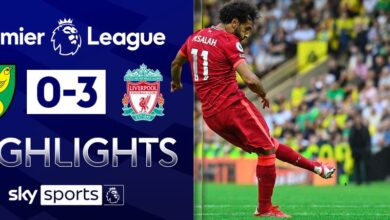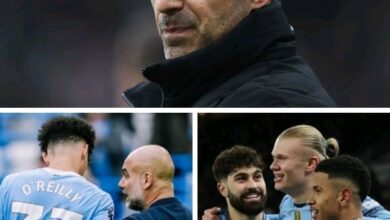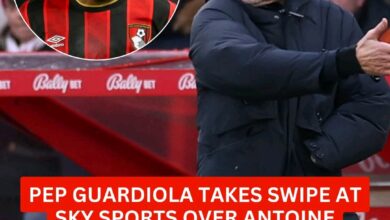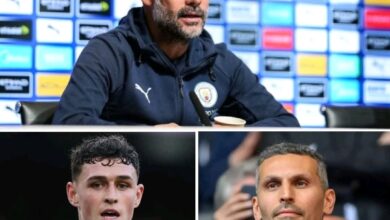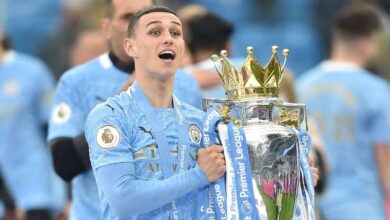Arsenal manager Mikel Arteta has said that he doesn’t get distracted by the transfer news surrounding the club, despite the need for a striker in January.
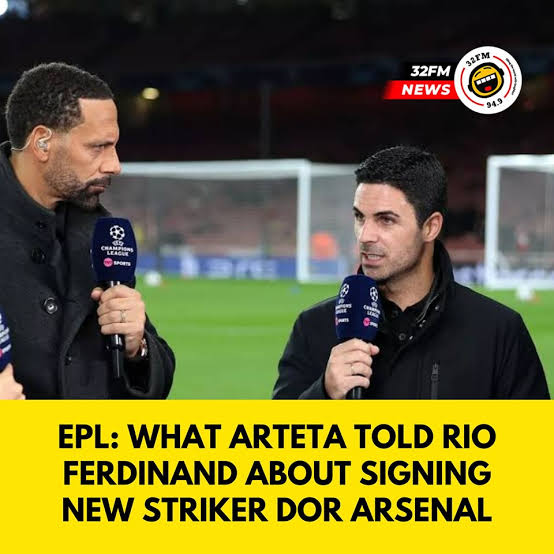
The world of football is a whirlwind of constant activity, with news surrounding transfers, injuries, and match previews taking over media outlets every day. Arsenal Football Club, one of the most storied clubs in English football, is no stranger to such intense media attention. However, amid the noise of transfer rumors and speculation, Arsenal manager Mikel Arteta has remained a calm and composed figure. As Arsenal struggles with a lack of depth in the striker position, Arteta’s leadership and approach to transfers have come under scrutiny, especially given the recent injury crisis.
In January 2025, Arsenal finds itself in a precarious situation. The team has long been known for its attacking style of play, often characterized by swift, dynamic football. Yet, Arsenal currently faces a significant challenge due to the lack of a reliable striker. This issue has become even more urgent after Gabriel Jesus, who has been a pivotal player for the Gunners, suffered an ACL injury earlier in the year.
With Jesus sidelined, Arsenal’s only striker option is Kai Havertz, who is not a traditional center-forward but has been tasked with leading the line in the absence of a more natural striker. Havertz’s versatility is an asset, as he can play in various attacking roles, but his best performances have come when he is not solely responsible for the center-forward role. This has left Arteta and the club’s supporters concerned about the lack of depth up front, especially given the demanding nature of the Premier League and other competitions.
Despite the urgency of the situation, Arsenal has not yet made a move in the transfer market to address this issue. This has sparked a significant amount of speculation about potential targets and whether the club will act in the January transfer window. The rumors have particularly intensified with Arsenal being linked to several world-class strikers, including names like Benjamin Sesko, Victor Osimhen, and Matheus Cunha. These players have all been seen as potential solutions to Arsenal’s striker dilemma, and their names have dominated transfer discussions surrounding the club.
In the midst of all this speculation, Mikel Arteta, who has been managing Arsenal since 2019, has continued to stress his focus on the bigger picture. Arteta, who has built a team that has shown considerable promise in recent seasons, remains unfazed by the noise surrounding transfers. He understands that the football world is filled with rumors, and as a manager, his focus must remain on the team’s immediate needs and upcoming matches, not on outside chatter.
In a recent pre-match press conference ahead of an important Champions League fixture against Dinamo Zagreb, Arteta addressed the media about the ongoing transfer rumors. “No, I understand it happens,” Arteta said when asked about the rumors linking Arsenal to multiple strikers. “In the summer, I had a lot of people texting me saying: ‘you’re after him?’ and sometimes I don’t even know what they’re talking about. I don’t follow that too much, I have enough work to do and we’ve got a lot of things on, so I don’t get too distracted by it.” His comments underscored his pragmatic approach to the transfer market, one that prioritizes the team’s objectives rather than getting lost in speculation.
When asked if he was enjoying the transfer window, Arteta replied, “I love it!” This simple yet candid response refle oncts Arteta’s approach to his role as a manager. He is undoubtedly aware of the importance of the transfer window, but his focus is always on making decisions that align with the long-term goals of the club rather than simply reacting to the latest headlines.
Despite Arteta’s insistence on staying focused on the team’s immediate goals, the transfer rumors surrounding Arsenal have continued to dominate the headlines. One of the most prominent names linked with a move to the Emirates Stadium is Matheus Cunha. The Brazilian forward has been a standout player for Wolverhampton Wanderers, scoring 10 goals in 21 Premier League matches during the 2024-25 season. His impressive form has attracted the attention of several top clubs, with Arsenal being one of the primary suitors.
Reports suggest that Cunha is yet to sign a new contract with Wolves, which has led to speculation that he could be available for a move in the January transfer window. However, Wolves have reportedly placed a hefty £80 million price tag on Cunha, which has raised concerns within the Arsenal camp. While Cunha’s performances have been exceptional, the high asking price may make it difficult for Arsenal to justify such an expenditure, particularly given the club’s financial considerations and their preference for more cost-effective options in the transfer market.
While Cunha has been a key figure in Wolves’ attack, Arsenal may be reluctant to meet the £80 million valuation. This reluctance could force Arteta and the club’s management to consider alternative transfer targets. It is also possible that the club may explore loan deals or moves for players who may offer better value for money in the short term.
One of the significant challenges that Arsenal faces in this transfer window is the financial implications of signing a new striker. The £80 million price tag on Cunha is an eye-watering sum for a club that has already made significant investments in recent transfer windows. Arsenal has been careful in its spending under Arteta, preferring to make strategic moves in the transfer market that align with the club’s long-term vision.
In recent years, Arsenal has invested heavily in strengthening its squad, bringing in players like Declan Rice, Kai Havertz, and Jurrien Timber, among others. While these signings have added quality and depth to the squad, they have also placed a significant financial burden on the club. The £80 million asking price for Cunha could complicate matters, particularly given that Arsenal may need to balance its books and ensure that any new signings are in line with Financial Fair Play (FFP) regulations.
Additionally, Arsenal has other pressing needs to address, such as strengthening its defense and midfield. The club’s focus may need to shift toward these areas, especially if Arteta believes that the team is well-equipped to cope with the striker situation in the short term. The complexity of managing the club’s finances while also addressing the needs of the squad adds another layer of difficulty to Arsenal’s decision-making process.
Another crucial factor influencing Arsenal’s transfer strategy is the impact of injuries on the team. Gabriel Jesus’ ACL injury has been a major setback for the club, as the Brazilian striker has been a central figure in Arsenal’s attack since his arrival from Manchester City. His absence has forced Arteta to rethink his attacking options and adapt to a system that does not rely on a traditional striker.
The lack of a proven goal-scorer has placed additional pressure on the likes of Havertz and other attacking players, such as Bukayo Saka and Martin Ødegaard, to contribute more goals. While these players have shown their quality in various positions, they are not natural center-forwards and may struggle with the physical demands of leading the line in every match.
Injuries have also taken a toll on other key players in the squad. For example, William Saliba, one of Arsenal’s standout defenders, has been sidelined with an injury, further reducing the club’s options in defense. The absence of key players has forced Arteta to make adjustments, both tactically and in terms of player selection, which has further complicated the team’s preparations for a busy period of fixtures.
As a result of these injuries, Arsenal’s transfer plans are likely to be influenced not just by the need for a striker, but also by the need to reinforce other areas of the squad. Arteta will need to carefully consider the available options and prioritize signings that can make an immediate impact on the team’s performance.
As much as Arsenal’s immediate needs are pressing, the club’s long-term vision remains central to its transfer strategy. Under Arteta’s leadership, Arsenal has made significant progress in terms of its playing style, its competitiveness in the Premier League, and its overall squad depth. However, Arteta understands that the success of the team is not built solely on big-money signings or short-term fixes.
Instead, Arteta has focused on developing young talent, bringing in players who fit into the club’s ethos, and building a squad that is capable of challenging for titles in the future. This approach has been evident in the signings of players like Bukayo Saka, Emile Smith Rowe, and Martin Ødegaard, who have all been integral to the team’s success in recent seasons. While Arsenal is undoubtedly looking to bolster its squad in the January window, Arteta will not make decisions based purely on short-term fixes.
This long-term approach is why Arteta has remained steadfast in his refusal to be distracted by the transfer rumors. He understands that while signing a world-class striker could improve Arsenal’s chances in the short term, it is equally important to continue the work of building a sustainable and competitive squad for the years to come.
In conclusion, Arsenal’s striker situation remains a critical issue as the club enters the second half of the 2024-25 season. The injury to Gabriel Jesus has left the team without a natural striker, and the club has been linked with several high-profile targets, including Matheus Cunha. However, Arsenal manager Mikel Arteta has maintained a calm and measured approach, focusing on the team’s immediate needs rather than the noise surrounding transfer rumors. While the £80 million price tag on Cunha may be too steep for Arsenal, the club remains committed to finding the right solution, whether through new signings or tactical adjustments.
With injuries continuing to impact the team, Arteta’s ability to manage the squad effectively will be crucial as Arsenal aims to maintain its competitiveness in both domestic and European competitions. Ultimately, the club’s long-term vision will guide its transfer strategy, as Arteta looks to continue building a team capable of challenging for titles in the future.






